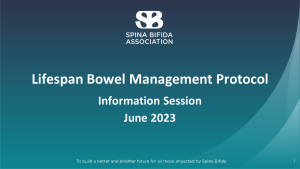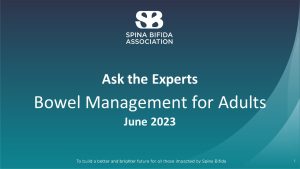The majority of those with Spina Bifida are at risk for bowel incontinence. In children and adolescents, bowel control is important for short and long-term health and plays a key role in the development of independence. For adults, urinary and bowel control is linked to educational attainment, establishing consequential social relationships, and employment. “One of the top priorities of people living with Spina Bifida is bowel management, which is critical for health and quality of life,” said Brad Dicianno, MD, Associate Medical Director at SBA. To provide timely, age-appropriate, and actionable resources, the Spina Bifida Association was pleased to host a bowel management education series. The cornerstone of these sessions was the introduction and explanation of the Lifespan Bowel Management Protocols.
The Lifespan Bowel Management Protocol (LBMP)
The LBMP was developed to further support healthcare professionals in the effective, evidence-based management of bowel incontinence – birth to adulthood – for those living with Spina Bifida and neurogenic bowel. It includes practical recommendations to assist healthcare professionals in making informed treatment decisions with available scientific data. The aggressive implementation of this Protocol will decrease incontinence rates reducing the overall health risk and increasing the quality of life for those living with Spina Bifida. The education series included the introduction of the LBMP to adults and caregivers as a tool to be used for bowel management and a guide for discussions with healthcare providers.
- Click here to download the Lifespan Bowel Management Protocol.
- Click here for instructions on how to download the LBMP.
For more information about the Lifespan Bowel Management Protocol please contact Judy Thibadeau, RN, MN, Spina Bifida Association Director of Research and Services at [email protected].
The following are the virtual sessions held as part of the Bowel Management Education Series. Each session includes a short description and a link session recording.
Community Information Session: Presenting the Lifespan Bowel Management Protocol – Information Session for Adults and Families –Presented Thursday, June 22, 2023 – Please click this link for the session recording.

Bowel management is easily one of the most frustrating and complicated aspects of Spina Bifida healthcare. People with Spina Bifida and their caregivers are invited to learn more about bowel management and how to use the Lifespan Bowel Management Protocol with their healthcare providers. The session also includes tips, resources, and best practices from parents and providers including:
- Colleen Payne, MRC, CRC
- Maryellen Kelley, DNP, CPNP, MHSc
- Eileen Sherburne, PhD, ACNS-BC, FNP-BC
- Heather Dorries
Ask the Expert: Bowel Management for Adults – Presented Tuesday, June 27, 2023 – Please click here for the session recording.
In addition to the medical consequences of neurogenic bowel dysfunction, such as the potential for urinary tract infections, skin breakdown, hemorrhoids, and anal fissures, studies show that adults with fecal incontinence are less likely to be independent, have fewer social and work opportunities, usually have lower educational attainment, and generally report a lower quality of life. Establishing and maintaining a consistent bowel management routine can help adults with Spina Bifida navigate these challenges. This session was a panel of medical, academic, and lived-experience bowel management specialists who answered live and pre-submitted questions.
- Maryellen Kelley, DNP, CPNP, MHSc
- Michelle Mravec Arthur, BSN, RN
- Joy Kerr, DNP, CPNP, -PC
Ask the Expert: Bowel Management for Parents and Caregivers – Presented Thursday, July 20, 2023 – Please click here for the session recording.
Along with the medical consequences of neurogenic bowel dysfunction, children may also face bullying, repeated school absences, and decreased self-esteem. Additionally, their parents and caregivers may also have high levels of stress and anxiety due to the amount of time, energy, and the unpleasantness associated with bowel management. This session was a panel of clinicians and parents of children with Spina Bifida who answered live and pre-submitted questions.
- Colleen Payne, MRC, CRC
- Heather Dorries
In addition to the information and resources referenced during the Bowel Management Education Series, the following are links to resources available on the SBA website:
- Guidelines for the Care of People with Spina Bifida: Bowel Function and Care
- Blog Post: Bladder and Bowel Management Podcast Features Voices from the Spina Bifida Community
- SB-YOU: Bowel Management Program Questions & Answers
The Spina Bifida Association is very pleased to offer this programming and the associated resources. With nearly 1,000 registrations, hundreds of post-presentation downloads and counting, and the many questions that were answered, we understand how important bowel management is to the Spina Bifida Community.
A special thank you to all those who made a gift when registering for the series. Your support means we can continue to provide valuable resources to the Spina Bifida community like the bowel management educational series and the Lifespan Bowel Management Protocol. Did you know your support can be in the form of a recurring gift? It’s quick and easy and your impact is immediate. Click here for more information and to make a gift.
About the Spina Bifida Association
The Spina Bifida Association (SBA), founded in 1973, now in its 50th year SBA is the only national voluntary health agency dedicated to Spina Bifida. The mission is to build a better and brighter future for all those impacted by Spina Bifida. Fueled by dedicated healthcare providers, parents, adults, caregivers, and others, we are committed to helping people live longer, healthier lives through Research, Education & Support, Clinical Care, Network Building, and Advocacy.

